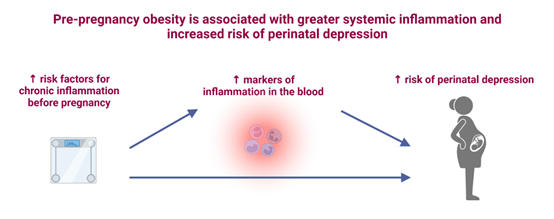Barwon Infant Study researchers: is perinatal depression caused by inflammation?

New research has provided evidence that the inflammatory reaction of the immune system could be a risk factor for perinatal depression.
Almost one in five women in Australia experience depression during pregnancy or in the first year following the birth of their baby. Although perinatal depression can have serious consequences for mothers and their families, researches are yet to fully understand what puts women at risk of developing depression during this period of life, and there are no effective prevention strategies.
Findings from the Barwon Infant Study, published in Brain, Behaviour and Immunity journal, provide evidence that chronic activation of the body’s immune system, also known as inflammation, plays a role in the risk to develop perinatal depression.
The team, led by paediatrician and Barwon Health Director of Research Professor Peter Vuillermin, collected blood samples from nearly 1000 pregnant women and also collected information regarding the women’s mental health.

Barwon Health and Deakin University School of Medicine senior scientist Dr Luba Sominsky (pictured) then led the analysis of inflammatory markers in the blood samples. The team then also analysed if differences in the levels of these inflammatory markers related to perinatal depression risk.
Dr Sominsky said the study showed pregnant women with high concentration of inflammatory markers in their blood were more likely to experience depression and stress symptoms during pregnancy.
“Women with high body mass index (BMI) before pregnancy are at a particular risk, due to the link that exists between excess BMI and inflammation,” Dr Sominsky said.
“However, women at the lower end of the BMI range in our study were also likely to experience poor mental health during pregnancy. These findings indicate the importance of a healthy lifestyle and its impact on mental health.

Prof Vuillermin said rates of perinatal depression were rising in the Barwon region, and many parts of the world, with a very concerning impact on mothers and their families.
“Our goal is to understand the causes and to then use this knowledge to inform prevention strategies,” he said.
“We have established a collaboration between Deakin University and the health services in our region, called the Pregnancy Research and Translation ecosystem (PRT-E), with the overarching goal of improving pregnancy care and outcomes.
“We are now building on these findings from the Barwon Infant Study by working with a larger population of women in our region to identify the major factors contributing to perinatal depression.
“Guided by the PRT-E stakeholder working group, we will co-design and implement interventions to drive improvements in perinatal mental health care. Our approach will, in part, target inflammation.”
The PRT-E team established a pregnancy stakeholder working group, comprised of obstetricians, midwives and consumers. One of the issues this working group has identified as a critical priority, is the increasing rates of perinatal depression in the region. Dr Sominsky, who leads the perinatal depression theme within the PRT-E study, is working closely with the stakeholder working group and the study investigators to identify factors driving the increase in perinatal depression rates and to develop potential prevention strategies.
